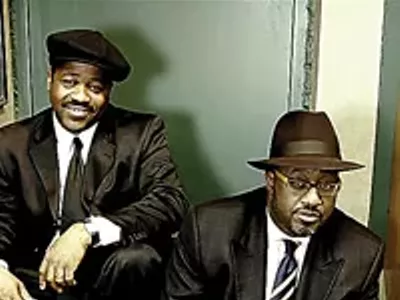
Audio By Carbonatix
[
{
"name": "GPT - Leaderboard - Inline - Content",
"component": "35519556",
"insertPoint": "5th",
"startingPoint": "3",
"requiredCountToDisplay": "3",
"maxInsertions": 100,
"adList": [
{
"adPreset": "LeaderboardInline"
}
]
}
]
"The two other times I played the Jazz Festival." says Bettye LaVette, whose new album, The Scene of the Crime, drops soon on punk imprint Anti- Records, "I was almost 'just a singer,' still trying to get a local gig.
"Certainly there were people who knew me there — I was born in Muskegon, but moved to Detroit when I was less than 2. But now, this time, I'm booked as 'Bettye LaVette,' so I'm going to do what I do."
And what this extraordinary vocalist does is soulfully sing an astonishingly wide range of material, sounding like she's shredding yards of silk with every syllable.
But then, LaVette could always sing. Born Betty Haskins, she scored a 1962 Top 10 R&B hit with "My Man — He's a Lovin' Man," her very first record, issued under the name Betty Lavett, at age 16. (The extra pair of "e"s and the capital "v" came later.)
"I went to St. George Elementary School and St. Agnes, a Catholic high school," she says, adding with a laugh, "but most of the people who lived in the North End with me — which is everybody people think are legends now — thought that I went to Northern High School 'cause I got out of school earlier, so I would go over there and stand on the corner and be one of them when they came out of school.
"I've actually seen arguments between people: 'I went to school with her.' 'No, you didn't; I went to school with her.' 'But she was always there!'" LaVette laughs again.
"But the first show I ever saw in Detroit, I was also performing on," LaVette reminisces. "There was Marvin Gaye, the Vandellas, Freddie Butler and me. We were at a place called Mister Kelly's, with a DJ whose name was Joe Howard. He and the DJs from WCHB kind of held down the east side. On the west side, it was Frantic Ernie Durham, and you would do another record hop for him an hour later at the Twenty Grand or the Graystone. You did that to get your records played. I did record hops with everybody.
"Because my first record was on Atlantic [which had picked up the rights from Johnnie Mae Matthews' local Detroit indie, Northern Records], most of the people who were on Motown at that time weren't considered very big. Just Marv Johnson and Mary Wells and Smokey Robinson. Everybody else was just wishing they were on Atlantic like I was." More laughter.
Matter of fact, LaVette was such a good singer that she'd wind up making records for 14 different labels with only sporadic R&B chart success — notably the mellow-dramatic, minor-keyed soul ballad "Let Me Down Easy," a pre-Bobbie Gentry's hit version of the racy "He Made a Woman Out of Me," and the smoldering "Right In The Middle" — and no Billboard Top 100 pop action whatsoever.
Although her first album didn't arrive until 1975, it wasn't for lack of effort. A 1972 session, recorded at the legendary Muscle Shoals Sound Studios during her second stint with Atlantic Records, was suddenly shelved — and remained unreleased until a European aficionado/label owner hauled it out of the vaults and issued it as Child of the Seventies in 2000.
In the meantime, LaVette had spent six years performing Bubbling Brown Sugar with Cab Calloway on Broadway and in various touring companies of the same show, cutting an '85 album for Motown, and waiting for the phone to ring.
The 2000 reissue rekindled interest in LaVette, who found an audience on the blues festival circuit, where she was spotted by Anti- Records President Andy Kaulkin. (A subsidiary of L.A.-based punk indie Epitaph, the Anti- label has recently been home to Tom Waits, Merle Haggard and Marianne Faithfull, among others.)
Pairing LaVette with producer/fellow Michigander Joe Henry — who'd worked similar magic for soul giant Solomon Burke's acclaimed Anti- album, Don't Give Up On Me — resulted in the magnificent I've Got My Own Hell To Raise.
Featuring LaVette's interpretations of tunes written exclusively by such contemporary female singer-songwriters as Dolly Parton, Lucinda Williams, Aimee Mann, Joan Armatrading, Fiona Apple and Sinead O'Connor, the 2005 release garnered rave reviews and — along with a memorable appearance on Late Night with David Letterman — introduced LaVette to a wider audience than ever before.
"I'm not a writer — I'm an interpreter," LaVette explains. "But I can't just sing anything. If I don't like the melody, I won't even listen to the lyrics. Then, the lyrics have to be something I would say to you at some time. That's the only way I can look at an audience. I can't say a bunch of shit I don't believe.
"And I've done this unconsciously all my life. Even when I was younger, I never chose songs that said 'You repeatedly treat me bad and I keep coming back.' I knew that wasn't something I wanted to say. My career and my life have given me enough pain, so I can convey pain to an audience without staying with some guy who beats me all the time. No. No. When you go out onstage, there are people who want to love you — and I let them." LaVette laughs.
"The other thing I always consider when choosing a song," LaVette continues, "is 'What am I going to be doing onstage while I'm singing this?' I won't sing a song in a tempo that I can't walk sexily or fluidly to. And it's not only fast songs. Because none of my records have ever sold, I've always had to think in terms of my show. This is what I'm presenting. And having done theater, I definitely think in terms of what I'll be doing when I'm singing these words.
"Nowadays, I think of the whole thing. I believe that if I had been successful after that first record, I wouldn't have been allowed to become the kind of singer that I am today. Because I would've been put into a tunnel and just learned how to do, say, 'The Twist' really, really well.
"But having to learn so many things, and with all this [success] happening so damn late in my life, I've been able to use everything — the good and the bad. There's not one thing that's happened to me that I've discarded. It's all made me a broader personality and that's very helpful to me now because I really don't know how much longer I can do this at this intensity." She laughs again.
All this history hangs heavily over LaVette's forthcoming album, The Scene of the Crime, which Anti- is set to release on Sept. 25. Recorded at Southern soul mecca Fame Studios in Muscle Shoals, Ala., the album takes its title from LaVette's having cut the tracks for those long-shelved 1972 sessions in that same city.
This time, however, LaVette's primary backing band is "alt-rock/country" outfit the Drive-By Truckers, whose co-founding singer/songwriter/guitarist Patterson Hood is the son of renowned session bassist David Hood, who played on those '72 sessions and contributes to a trio of tunes on the new LP. (Fellow Southern-soul stalwart Spooner Oldham adds keyboards throughout.)
Sporting tracks penned by songsmiths Willie Nelson ("Somebody Pick Up My Pieces"), Don Henley ("You Don't Know Me At All"), John Hiatt ("The Last Time") and Ed Pettersen ("I Guess We Shouldn't Talk About That Now"), as well as songs associated with George Jones ("Choices") and Ray Charles ("They Call It Love"), and two tunes by the late, great blue-eyed soulsters Eddie Hinton and Scotland's Frankie Miller ("Take Me Like I Am" and "Jealousy," respectively), LaVette's scorching takes on these titles further blur the line between country and soul.
Finding the sort of material that fits LaVette like one of her Size 6 dresses was anything but a simple process. "Patterson sent me a bunch of songs and Andy [Kaulkin] sent me a bunch of songs — I didn't like any of 'em," confesses LaVette, who shares co-production credits on the album with Hood and longtime Truckers knob-twirler David Barbe.
"But my husband of the last four years is a music enthusiast — unlike me, who doesn't really sit around and listen to music, he listens to music continuously — and he's been pitching songs to me ever since we've been married. He must've given me about 4,000 songs that I've narrowed down to 50, so I told Patterson and Andy to pick 20 from those. Then I chose 10 from that. And I'm very grateful that Patterson and Andy let me choose my own songs — which I've done as long as both have been alive." LaVette laughs.
"I've never had a record company that looked at me so artistically. I think Andy looks at me more artistically than I do myself. He was there at the sessions to make sure nothing overwhelmed me.
"And I'm grateful to the Truckers [Hood, co-founding singer/songwriter/guitarist Mike Cooley, pedal steel guitarist John Neff, bassist Shonna Tucker, and drummer Brad Morgan] for not forcing themselves on me. And I know that when people hear this record, they'll know this isn't the way the Truckers normally play. But the Truckers looked at it more like trying to become part of something that contributed to me. They relinquished themselves. And that was good."
The other two songs on the album merit closer examination. Co-written by Patterson Hood and LaVette herself, "Before the Money Came (The Battle Of Bettye LaVette)" is an obviously autobiographical splice of life ... and life only. The songs spans the 40 years when record companies tried to figure out where she fit in, including the times when late Temptations singer David Ruffin slept on her floor and all her friends — Aretha Franklin, Diana Ross, Smokey Robinson, Stevie Wonder, Wilson Pickett — were appearing on the Grammys, while she struggled to get a gig that would pay her $50 a night ... before the money came.
It's a bittersweet picture, enlivened by LaVette constantly pushing her raw, throaty vocals almost to the breaking point.
Meanwhile, the album's highlight has to be LaVette's take on Elton John and Bernie Taupin's "Talking Old Soldiers," which is almost impossibly stark, dark and on the mark.
Describing the song's process from genesis to revelation, LaVette says, "I told 'em, 'Listen, I've never been a soldier and I don't drink beer.'
"Then Andy said, 'Well, what happened to all this theatrical prowess you keep claiming?'
"I said, 'Gimme that goddamn song. I'll show you.'
"I remembered a place in Detroit called the Locker Room," LaVette continues. "I'd be there with Pervis [Jackson] of the Spinners. He'd sit at one end, called the Big Shots end. And I'd sit at the other end of the bar, which was called the Dirty Dozen. But my respect was based upon being a woman, first of all, and that people who were in there, who were our age, remembered me from the Twenty Grand.
"But I didn't have anything new going on, so I went there once a week to sit and drink and cry and send my tabs down to Pervis' end of the bar." LaVette laughs.
"But other people came there every day after work — it was kind of a home away from home — and so many of our friends, who drank like that every day for hours and worked all day too ... Well, I was just there recently, and so many of those people who'd supported me for years — sometimes I'd do local gigs and there'd be nobody there but the people from the Locker Room — weren't there anymore, 'cause they'd died. Back when I was a regular, everybody sat at the same barstool all the time, so you could just look around and see who was missing.
"So I started to think: No, I'm not an old soldier. But this song doesn't have to be about that. It can be about this. The gist of it is still there. And I thought, this will be a little different challenge and it'll keep me from just being the old resurrected blues broad in a bar."
Considering that seeing a trim 'n' toned LaVette strutting her 61-year-old stuff onstage is about as far from the stereotypical, broke-down, coasting-on-their-legacy performer as it gets, one has to wonder about her workout regimen.
"When I'm working," LaVette says, "everybody's always forcing me to eat 'cause I get so small. When I get through walking across that stage for 90 minutes in those four-inch heels, holding my stomach in and pattin' and blowin' and singin' 'Joy,' that's like an hour-and-a-half workout.
"But when I'm off, I do yoga. I do a lot of stretching to keep everything from crunching up. I just try to balance my own weight on my arms and keep everything stretched out so I can sit down on the floor and get up easily like I do in my show.
"Up until five years ago, though, when I was waiting for the world to call, I worked out every morning like I was shadow-boxing to keep myself from being frustrated. And I did a lot of yard work, which toned my arms. I cut my grass and trimmed my hedges so well that people were stopping and giving me their card, saying, 'If you ever want to do my gardening ... '" LaVette laughs.
Looking back at her journey from perennial bottom-of-the-bill to hipster headliner, LaVette says, "At first, I just had a voice and a feeling. Now I understand the feeling and the meaning of the song. And how to choose songs that say what I want to say.
"And all of that comes from the same man, [her now-deceased former manager] Jim Lewis. He taught me how to phrase and how to style. Made me learn extremely difficult songs like 'Lush Life' and 'Sophisticated Lady,' so musicians would respect me even though I couldn't read music. 'Cause in the '30s and the '40s, if you couldn't read or really, really sing, you were frowned upon.
"But he made me learn them and now I feel so qualified. You don't know the solace it gives me when I look in the face of a Beyonce or a Joss Stone or any of the other young ladies who are full of hip and lip and booty, and know I can just lean against a piano and not just sing these songs, but sell them — which is a completely different thing."
Don't look for LaVette to be cutting an album's worth of standards anytime soon, though. "I've already had the misfortune of being forced to sing those songs night after night in small little dives for years," she says. "I'm looking to do something else. I want to do something that nobody else is doing, something that I want to do."
After all, Bettye LaVette can still sing.
At 6 p.m. Monday, Sept. 3, on the Carhartt Amphitheatre Stage as part of the Detroit International Jazz Festival.
Don Waller is a freelance writer. Send comments to letters@metrotimes.com.





